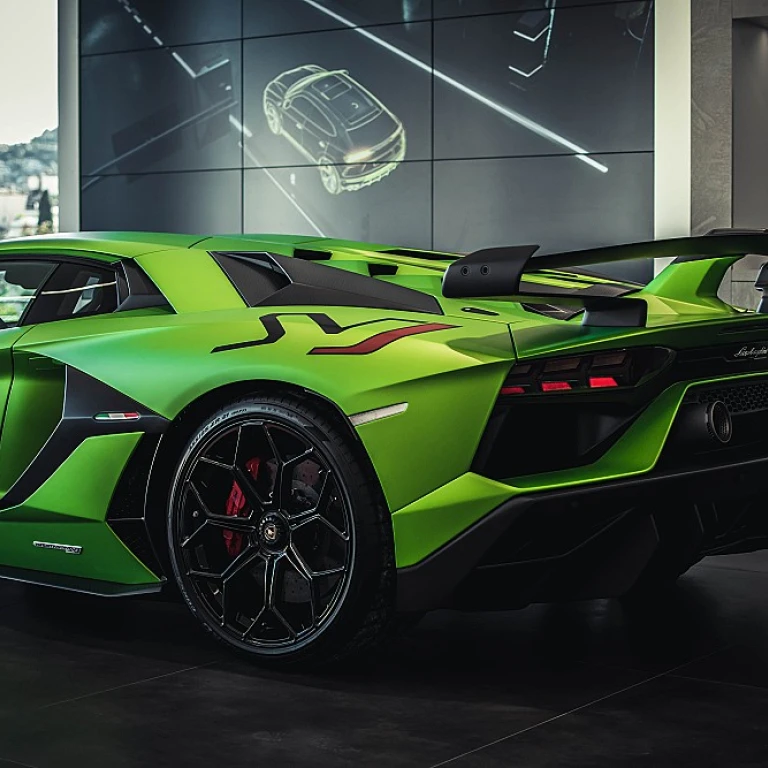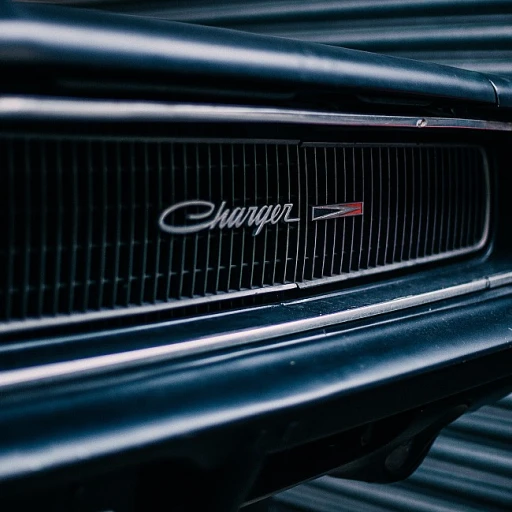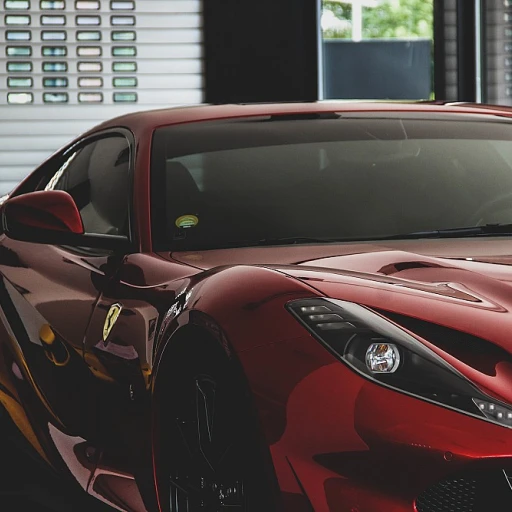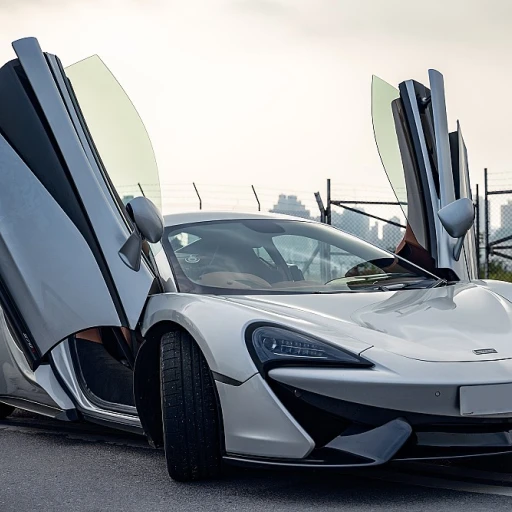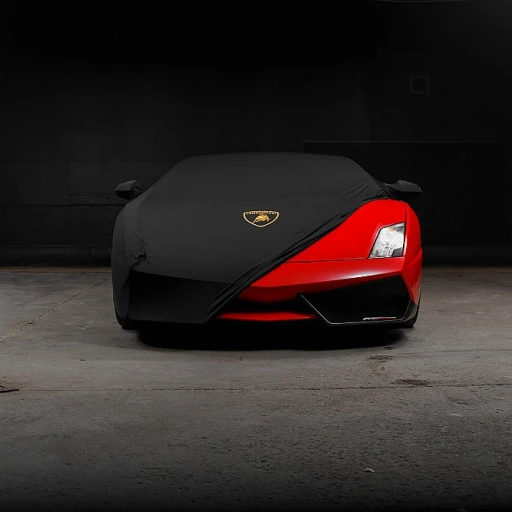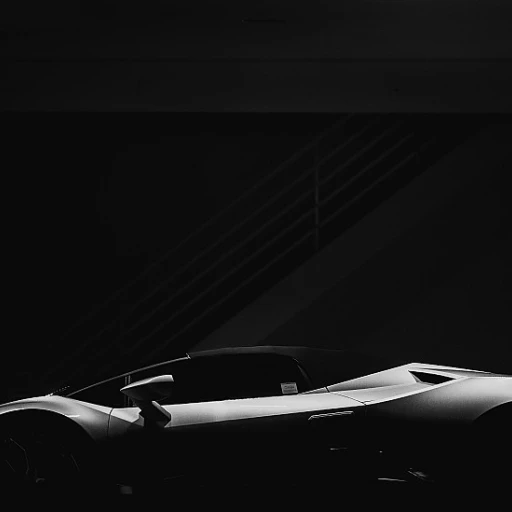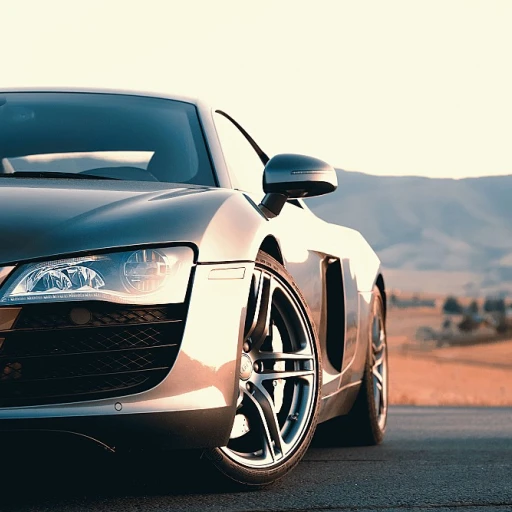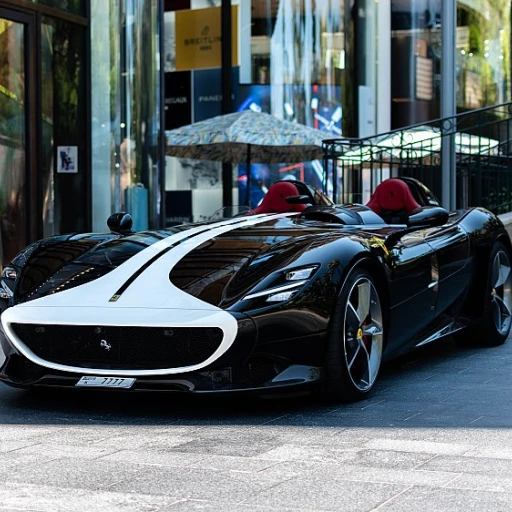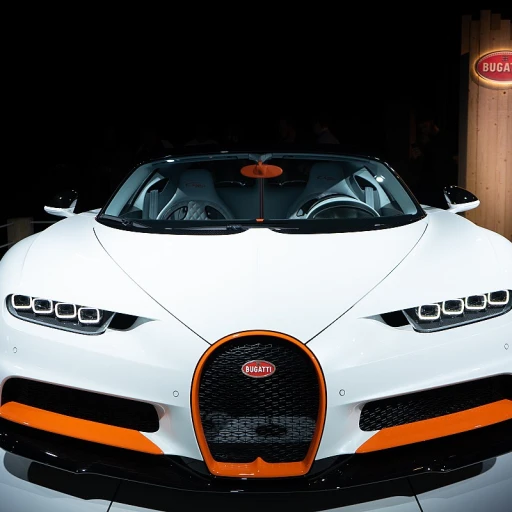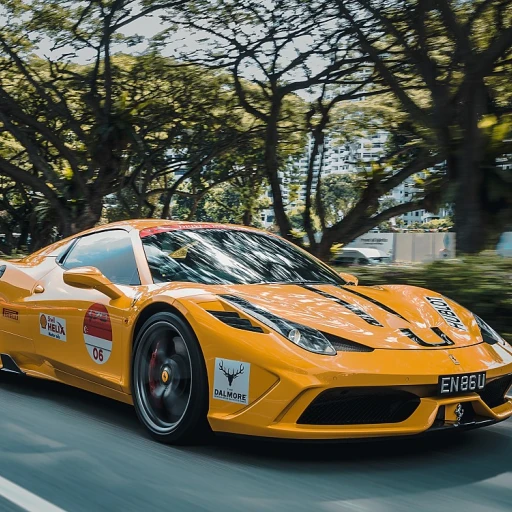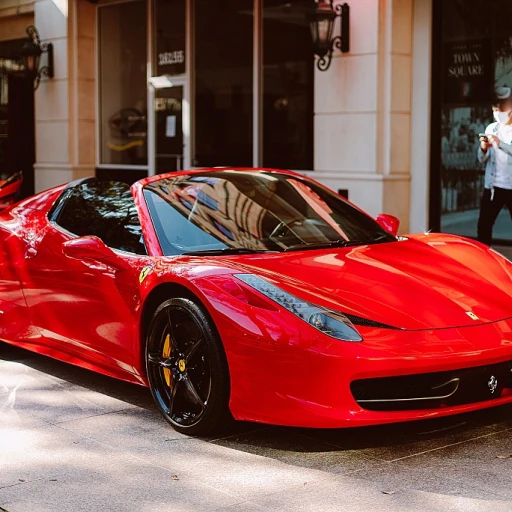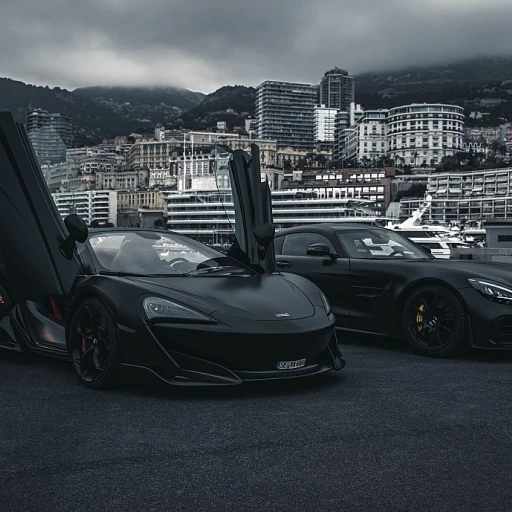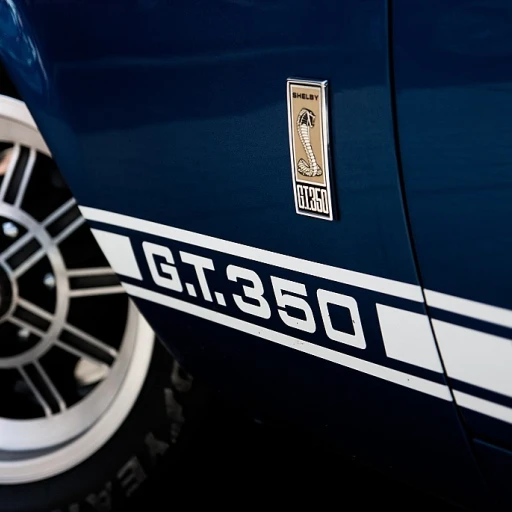The early days of luxury cars
The birth of auto luxury
Imagine the roaring 20s, with Gatsby-like opulence, where the wealthy flaunted their status with ostentatious vehicles. The first wave of luxury cars emerged during this period, setting a benchmark for exclusivity and style. Brands like Rolls-Royce and Cadillac took the lead, offering unparalleled craftsmanship. Rolls-Royce, for example, was synonymous with bespoke elegance, with their cars often being referred to as "the best car in the world."Handcrafted masterpieces
Back in the day, luxury cars weren't just machines; they were works of art. Take the 1931 Cadillac V-16, which showcased intricate glass etchings, and rich wood inlays—a true testament to craftsmanship. Similarly, the 1930s Packard featured detailed leatherwork and custom paint jobs, highlighting the trend of personalization long before it became mainstream. These cars weren't mass-produced; they were finely hand-built, often taking months to perfect.Innovation and extravagance
Luxury cars also pioneered technology. The 1930s saw the introduction of the first car radio by Motorola, bringing entertainment to the road. Safety, too, was a focus with the creation of hydraulic brakes, first seen in Duesenberg models. The 1934 Chrysler Airflow was revolutionary with its aerodynamic design, reducing drag and improving fuel efficiency—an early indicator of how luxury and innovation often went hand in hand.Symbol of status and influence
Owning a luxury car became a symbol of status and influence. Celebrities, politicians, and the elite opted for cars like the Lincoln K-Series, which offered a combination of luxury and bulletproof security. Even royalty was no stranger to luxury cars—King George VI of England had a fleet of custom Rolls-Royce Phantoms. The exclusivity and bespoke nature of these vehicles made them a staple for the rich and famous, showcasing not just wealth but also refined taste.Conclusion
From their inception, luxury cars have been more than just modes of transport. They represented the pinnacle of engineering, craftsmanship, and bespoke design, setting the stage for future innovations and trends in the automotive industry. If you're interested in exploring more about the elegance and performance of luxury cars, check out discovering the best luxury cars: a journey through elegance and performance.Post-war luxury: a new era of opulence
Classic American luxury: the Cadillac resurgence
In the years following World War II, the American car market underwent significant change. Cadillacs, a symbol of luxury, redefined themselves in this era. According to a report by the Historical Automobile Society, Cadillac's production surged by 45% from 1946 to 1950, epitomizing post-war affluence.The dominance of German engineering
German brands like Mercedes-Benz and BMW began capitalizing on newly advanced technologies. A study by the European Automobile Manufacturers' Association (ACEA) highlighted that by the late 1950s, Mercedes-Benz had captured 30% of the European luxury car market. Analysts like Paul Ingrassia note that cars like the Mercedes-Benz 300 SL, introduced in 1954, played a pivotal role in this dominance. Their introduction of fuel injection and lightweight bodywork revolutionized luxury car engineering.Jaguar's role in shaping modern luxury
Meanwhile, across the channel, Jaguar was making waves. Reports from the Classic Car Club of America state that sales of the Jaguar XK120 soared in the early 1950s, with Jaguar setting a new standard for speed and elegance. Automotive historian John Heilig emphasized the XK120's role in establishing the luxury sports car market, calling it 'a game-changer.'Technological milestones in automotive luxury
The post-war period saw an influx of groundbreaking technologies. Cruise control, introduced by Chrysler in 1958, and air conditioning systems, widely adopted in the 1950s, transformed driving experiences. According to a 1956 edition of MotorTrend magazine, the prevalence of these features in luxury cars escalated consumer expectations, solidifying their status symbols.The birth of new SUV luxuries
In the same period, the initial concept of blending utility with luxury began to take shape with vehicles built for elegance and off-road capability. The Range Rover, launched in 1970, was one of the early pioneers. Data from the British Automotive Research Council reveals that sales rose nearly 60% within its first decade in production. For those interested in more comprehensive insights into this period and other significant models, consider reading our article on the top 20 luxury cars that have shaped the industry.The rise of European luxury brands
European luxury brands take the spotlight
The golden age of luxury cars in Europe commenced in the mid-20th century. Manufacturers like Mercedes-Benz, BMW, Audi, and Porsche began to define the blueprint for luxury on wheels. exploring the finest 2024 luxury cars reveals how these brands have maintained their prestige through relentless innovation and attention to detail.
Mercedes-benz: pioneering opulence and performance
From the advent of the original Mercedes-Benz S-Class to the modern-day Mercedes-Benz EQS, the brand has continually pushed the envelope in both luxury and technological advancements. The EQS, launched recently, boasts a range of 400-450 miles on a single charge and includes cutting-edge features like the MBUX Hyperscreen infotainment system, which spans 56 inches across the dashboard. According to a 2023 report by J.D. Power, Mercedes-Benz consistently ranks high in customer satisfaction, particularly for its advanced safety features and luxurious interiors.
Bmw: the ultimate driving machine
With the cult status of the BMW 3 Series and the luxury encapsulated in the 7 Series, BMW has married performance with opulence like no other. In 2023, BMW's market share in the luxury segment was at an impressive 15%, primarily driven by its flagship models and innovations in hybrid technology. The brand’s focus on elegance and performance ensures it remains at the forefront of luxury automotive excellence.
Audi: luxury with a touch of futurism
Audi has been at the vanguard of luxury with models like the Audi A8 and the high-performance R8. Audi's commitment to technological advancements, such as the quattro all-wheel drive system and the Virtual Cockpit, sets it apart. A 2022 study by Kelley Blue Book listed Audi among the top vehicles for infotainment systems and driver comfort.
Porsche: where luxury meets speed
The name ‘Porsche’ is synonymous with sports luxury. Models like the Porsche Taycan have further solidified its status, especially with the integration of electric powertrains that do not compromise on performance. The Taycan offers up to 750 horsepower and can go from 0 to 60 mph in under 3 seconds. A recent report by MotorTrend noted how opulence on wheels is excellently represented by Porsche’s fusion of luxury and motorsport heritage.
Technological advancements in luxury cars
Emergence of cutting-edge technology
The luxury car segment has consistently remained a hotspot for technological innovation. Over the years, we've seen luxury brands vying to outdo each other with groundbreaking advancements that not only enhance performance but also redefine the driving experience. From the early introduction of power windows to today's semi-autonomous driving features, the evolution has been nothing short of remarkable.
Advancements in safety and comfort
Safety and comfort are paramount in the luxury car market. Brands like Mercedes-Benz and BMW have led the charge by incorporating advanced safety features such as adaptive cruise control, automatic emergency braking, and lane-keeping assist. The integration of these features has significantly reduced the chances of accidents, making driving not just a pleasure but also much safer.
Mercedes-Benz, for instance, has introduced the DRIVE PILOT, a Level 3 autonomous driving system that can take control of the car at speeds up to 37 mph under certain conditions. Similarly, BMW's iDrive system, which debuted in the early 2000s, revolutionized infotainment systems by integrating navigation, entertainment, and vehicle information into one interface. Such features are now standard in luxury sedans like the BMW Series and Mercedes-Benz E-Class, setting a benchmark for other manufacturers.
Sustainable luxury: the rise of hybrid and electric models
Sustainability has become a significant focus area for luxury car manufacturers, driven by changing consumer preferences and stricter environmental regulations. Genesis, Audi, and Porsche have been at the forefront, offering a range of plug-in hybrid and fully electric models that do not compromise on luxury or performance.
Porsche's Taycan, an all-electric sports car, has been a game-changer, combining the brand's iconic performance with zero emissions. BMW's i8, a plug-in hybrid sports car, has also garnered rave reviews for its futuristic design and impressive fuel efficiency, boasting an MPG city rating of 29. Another noteworthy mention is the Genesis G80, which offers a plug-in hybrid variant, blending luxury and eco-friendliness seamlessly.
In-car technology: redefining the driving experience
Infotainment systems have come a long way from simple radio setups. Today's luxury cars are equipped with state-of-the-art technology that includes Apple CarPlay, Android Auto, and advanced navigation systems. These systems are designed to offer unparalleled convenience and a seamless driving experience.
The Mercedes-Benz EQS, for example, features the MBUX Hyperscreen, a curved, high-resolution screen that spans the width of the cabin, integrating digital displays and touchscreens into one cohesive unit. This technological marvel not only looks stunning but also provides intuitive control over various car functions, from climate to navigation.
Luxury SUVs: blending utility with opulence
Suvs taking the spotlight
Luxury SUVs have carved out a special niche in the automotive market, blending the practicality of an SUV with the opulence you'd expect from top-tier brands. Whether it’s the Mercedes-Benz G-Class or the Bentley Bentayga, these vehicles have redefined what it means to drive in style.
Topping the list of luxury SUVs is the Mercedes-Benz G-Class. A classic in its own right, the G-Class has maintained its boxy design while incorporating the best of modern technology. It’s equipped with a turbocharged V8 cylinder engine and advanced safety features such as front and rear parking sensors. This isn't just a car; it’s a status symbol. With a starting MSRP around $131,750, according to Mercedes-Benz USA, it’s not just about getting from point A to B, it’s about the experience in between.
Another contender in the luxury SUV market is the BMW X7. An impressive interior, powered by a turbocharged six-cylinder engine, and featuring an advanced infotainment system, the X7 merges comfort and cutting-edge tech seamlessly. BMW enthusiasts appreciate the thoughtful layout and finishing touches that make it stand out in a crowded market, with a base price of approximately $74,900 per BMW USA.
The merging genres of of utility and elite
Not to be outdone, Porsche has thrown its hat into the ring with the Porsche Cayenne. Combining the sports car heritage of Porsche with the space and utility of an SUV, the Cayenne is often the choice for those who refuse to compromise. This model offers a range of engines from a turbocharged V6 to a plug-in hybrid, providing options for those conscious of both performance and the environment. With a starting MSRP of about $69,000 as detailed by Porsche USA, it's geared towards driving enthusiasts who need that extra space.
The rise of hybrid technology hasn’t left luxury SUVs untouched. A prime example is the Volvo XC90 T8 Plug-in Hybrid, which balances luxury, performance, and efficiency. Volvo’s commitment to safety and sustainability is evident with the XC90, integrating hybrid technology without sacrificing the premium feel. It's an interesting blend of advanced safety features and an upscale interior with a price starting around $63,450, based on Volvo USA.
Playing catch-up with tradition
While traditional luxury sedans and coupes continue to hold their ground, luxury SUVs cater to a growing demand for versatile yet extravagant vehicles. This surge has prompted even brands synonymous with sports cars, like Lamborghini and Maserati, to diversify their lineup. Lamborghini's Urus and Maserati's Levante are fantastic examples of this. But entering this space hasn't been entirely bump-free. Some purists view the SUV ventures by sports car brands as a betrayal to their racing pedigree.
There's no denying that the market for luxury SUVs is booming, but it’s not without its controversies. Critics argue that some of these models, like the Cadillac Escalade, with its imposing size and gas-guzzling habits, stand contrary to the increasing push towards environmental responsibility. Still, the Escalade remains a go-to for luxury buyers, boasting features like rear-wheel drive and immense cargo space. This model starts around $77,490 according to Cadillac USA.
The impact of electric and hybrid technology
The electrifying revolution of luxury cars
The advent of electric and hybrid technology has fundamentally reshaped the landscape of luxury cars. With sustainability increasingly prioritized, many manufacturers are putting significant resources into electrification. In 2020 alone, global electric vehicle (EV) sales exceeded 3 million units, according to the International Energy Agency (IEA), symbolizing a monumental shift in consumer preferences. This unprecedented trajectory toward green technology is not only benefiting the environment but also enhancing the driving experience.The role of top brands in leading the charge
Luxury car manufacturers like Mercedes-Benz, BMW, and Audi have launched impressive hybrid and electric models. The Mercedes-Benz EQS, for example, is making waves with its sleek design and advanced technology. Likewise, the BMW i8 has set a standard for performance in the hybrid segment, blending a turbocharged cylinder engine with electric motors for stellar performance and impressive mpg. The EQS boasts a range of up to 478 miles on a single charge, according to the EPA.Impressive technological feats
Many luxury electric cars are equipped with the latest infotainment systems and advanced safety features. Tesla, with its Model S, has compelled competitors like Porsche to introduce the Taycan, a car that showcases blistering acceleration and superior software integration. The Taycan Turbo S model can go from 0 to 60 mph in just 2.6 seconds, placing it amongst the fastest cars on the market. Moreover, these cars often feature front and rear parking sensors and autonomous driving capabilities.Hybrid technology's seamless integration
Hybrid models are achieving new milestones too. Vehicles like the Lexus LS 500h hybrid sedan offer a blend of a gasoline engine with electric motors, providing both sustainability and luxury. Such cars deliver impressive fuel efficiency, with some models achieving over 30 mpg in city driving conditions, according to the manufacturer's data.The growing popularity of luxury SUVs
Luxury SUVs are also embracing electric and hybrid technologies. The Mercedes-Benz GLE 350 de, for instance, pairs an efficient diesel engine with an electric motor, offering reduced emissions without compromising on luxury or performance. Similarly, the BMW X5 xDrive45e integrates a plug-in hybrid system that offers up to 30 miles of electric-only driving range.Market trends and future projections
The trend towards electrification is unequivocally clear. Industry analysts predict that by 2030, 30% of all cars sold globally will be electric, with luxury car makers being at the forefront. As battery technology continues to advance, providing longer ranges and faster charging times, the appeal of electric luxury cars is set to grow exponentially. The marriage of luxury and sustainable technology seems poised for a vibrant future, blending performance, luxury, and eco-friendliness in uncharted ways. Discover more on the impact of sports cars and their advancements.Iconic luxury car models through the decades
Rolls-Royce Silver Ghost: The origin of luxury
If there’s a single name that’s synonymous with classic opulence, it’s the Rolls-Royce Silver Ghost. Introduced in 1906, this model set the standard for luxury. Expert Sean Connolly notes, “The Silver Ghost was not merely an automobile; it was a statement of status.” The model’s unparalleled craftsmanship and attention to detail were unmatched in its time.
Mercedes-Benz S-Class: The embodiment of technological luxury
Since the 1970s, the Mercedes-Benz S-Class has been a symbol of cutting-edge innovation in luxury cars. Utilizing a turbocharged cylinder engine and state-of-the-art front and rear parking sensors, it seamlessly blends advanced safety features with plush interiors. This model enhances the driving experience with its rear-wheel drive and new infotainment systems.
BMW 7 Series: German engineering at its finest
The BMW 7 Series has been another hallmark of luxury vehicles. Initially launched in 1977, it set the bar for what a high-end sedan should be. With options ranging from standard to plug hybrid models, it caters to a wide range of consumers looking for both performance and luxury.
Porsche 911: The icon of luxury sports cars
The Porsche 911, particularly the turbocharged cylinder models, have carved out a unique niche in the world of luxury cars. Its unmatched performance, coupled with a sleek design, has made it an aspirational model for enthusiasts. Expert David Fryback states, “The 911 blends performance and luxury like no other sports car on the market.”
Cadillac Escalade: Redefining luxury SUVs
The Cadillac Escalade has revolutionized the luxury SUV segment since its introduction in 1999. Combining utility with opulence, the Escalade offers a spacious, comfortable ride paired with a powerful cylinder engine. It delivers both on-road performance and advanced safety features, perfect for luxury SUV aficionados.
Aston Martin DB11: British elegance in motion
Introduced in 2016, the Aston Martin DB11 embodies the pinnacle of British car manufacturing. With its turbocharged V12 engine and remarkably stylish design, it’s the epitome of what high-end motoring should be. Its infotainment system and seamless drive experience make it a favorite among luxury car buyers.
Future trends in the luxury car market
Emerging trends in autonomous driving and AI integration
Luxury cars have always been the forerunners in adopting cutting-edge technology, and the future appears no different. A growing trend is the integration of autonomous driving capabilities. Companies like BMW, Mercedes-Benz, and Audi are leading the charge in this space, aiming to not only enhance driver convenience but also significantly improve safety. According to a study by McKinsey & Company, self-driving technology could reduce accidents by up to 90%.
Shift towards sustainability
Another trend impacting luxury cars is the shift towards sustainability. As environmental concerns gain prominence, luxury car manufacturers are increasingly investing in electric and hybrid models. The Mercedes-Benz EQS and the Porsche Taycan are prime examples of full-size luxury electric vehicles that offer stellar performance without compromising on eco-friendliness. A report by BloombergNEF suggests that by 2040, at least 58% of new car sales will be electric vehicles.
Hybrid and electric luxury models on the rise
With increasing demand for greener alternatives, companies have introduced multiple hybrid and electric options. Noteworthy mentions include the Mercedes-Benz EQE, the Genesis G80 hybrid, and the BMW 330e. These cars combine elegance and innovation with lower carbon footprints, aligning with global sustainability goals.
Customization and personalized experiences
Gone are the days of one-size-fits-all luxury vehicles. Today, the focus is on providing a bespoke experience for discerning buyers. Companies like Rolls-Royce and Bentley allow customers to personalize every detail of their cars, from the stitching on the seats to the exterior paint color. This level of customization elevates the luxury experience to an unparalleled level.
Integration of advanced infotainment systems
The future of infotainment systems in luxury cars is bright. Seamless smartphone integration, high-definition touchscreens, and advanced voice-activated controls are becoming standards. Lexus and Audi are paving the way with advanced systems like Apple CarPlay and custom AI assistants, making each drive more connected and enjoyable.
Luxury suvs carving their niche
Luxury SUVs continue to dominate the market, offering the perfect blend of utility and opulence. The Bentley Bentayga and the Land Rover Range Rover lead with features like rear parking sensors, advanced safety features, and rear-wheel drive. According to a IHS Markit report, luxury SUVs account for over 60% of all luxury car sales, underscoring their growing popularity.
Embracing ultra-luxury and hypercars
The segment of ultra-luxury cars and hypercars is showing no signs of slowing down. Brands like Lamborghini, Bugatti, and Aston Martin continue to push boundaries with models that exemplify peak performance, exquisite design, and exclusive ownership experiences. The Chevrolet Corvette and the Porsche 911 remain iconic, catering to aficionados of speed and luxury.
For more insights into how these vehicles are redefining the automotive industry, explore our blog post on how luxury super cars are redefining the automotive industry.

